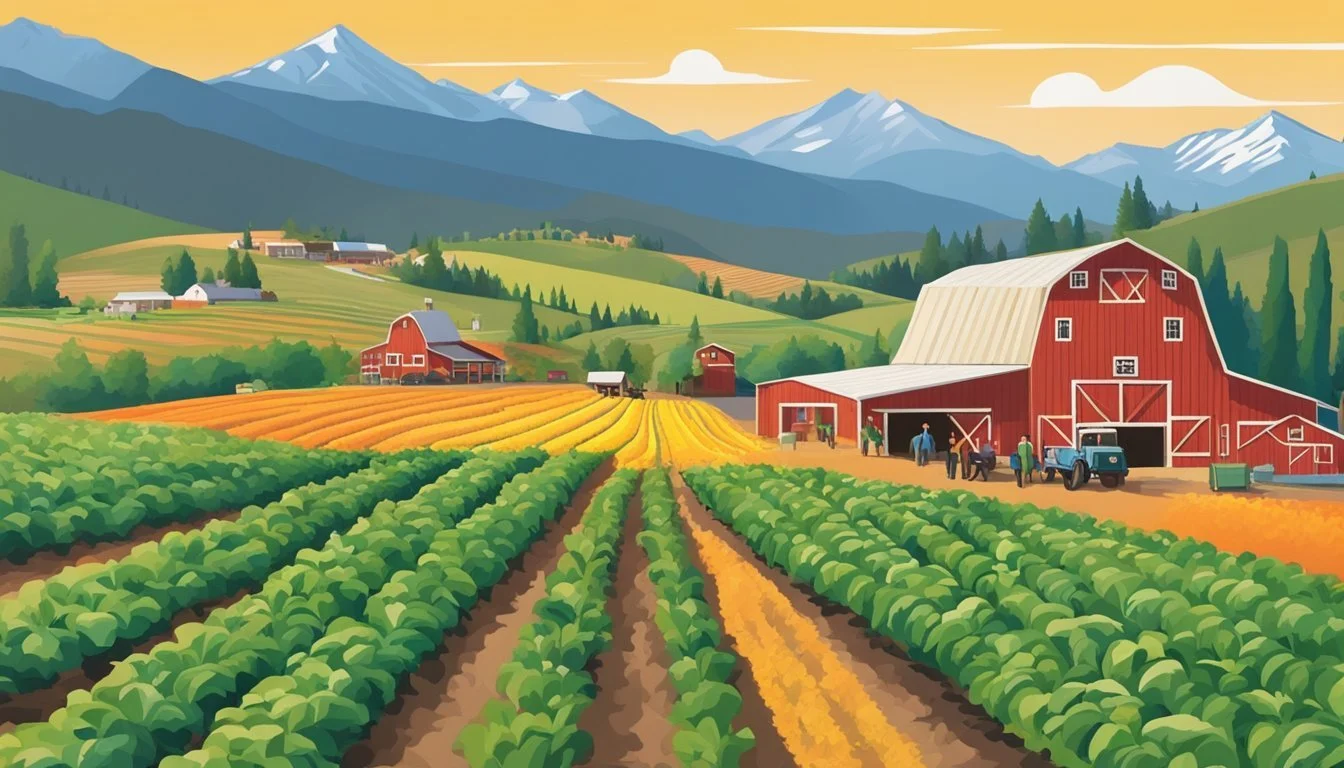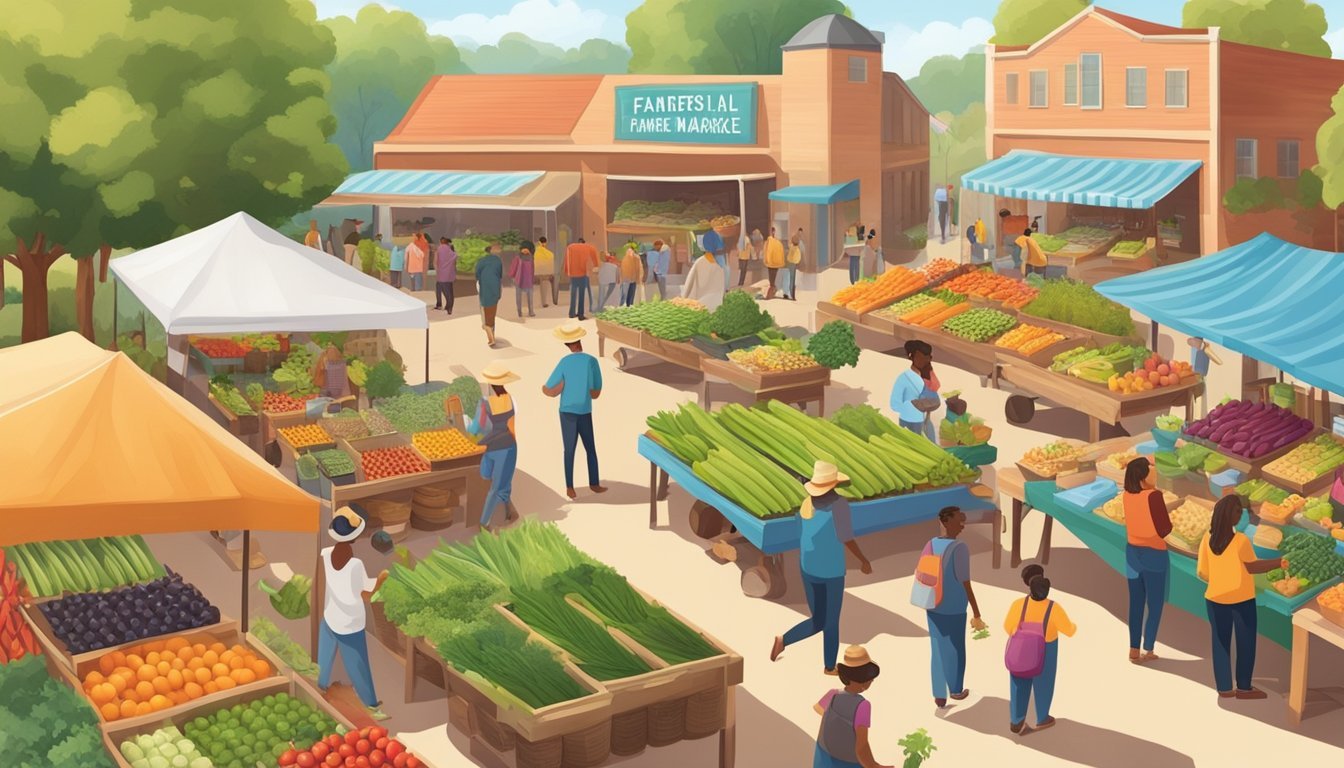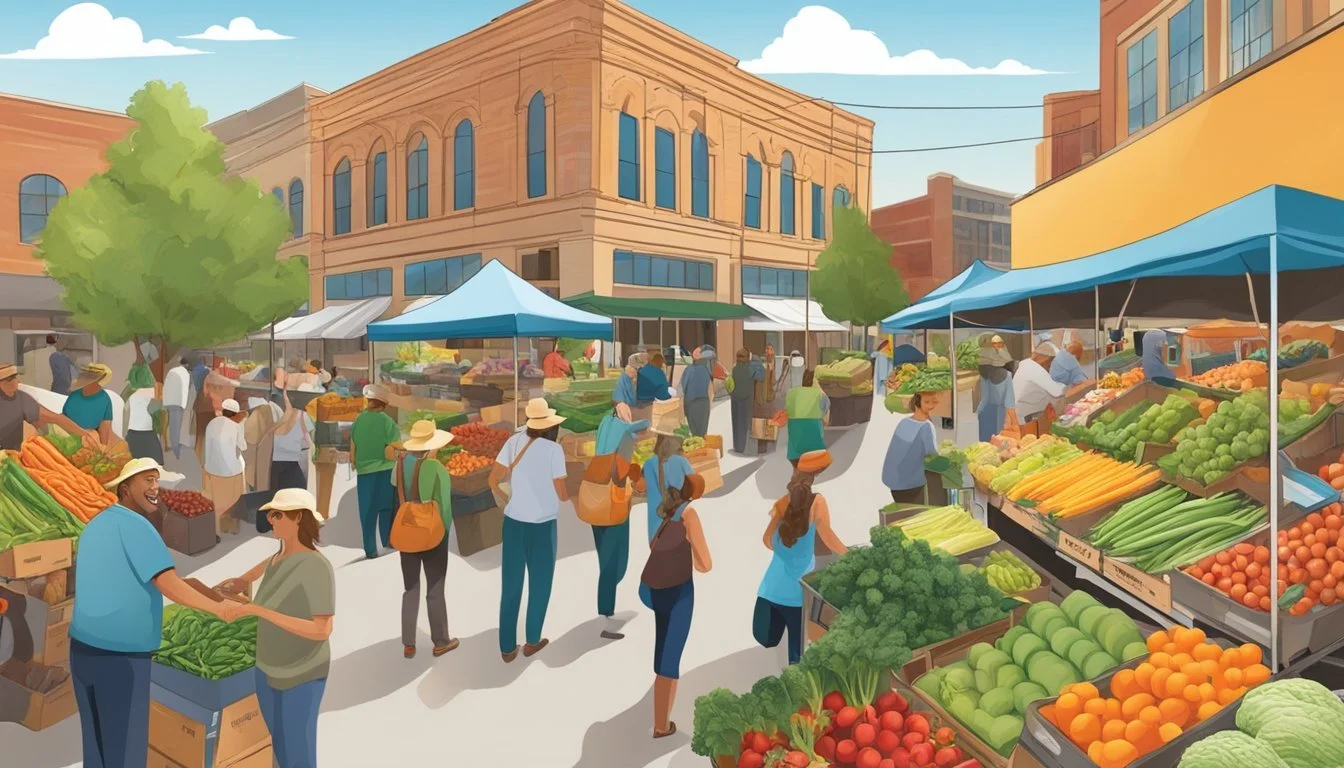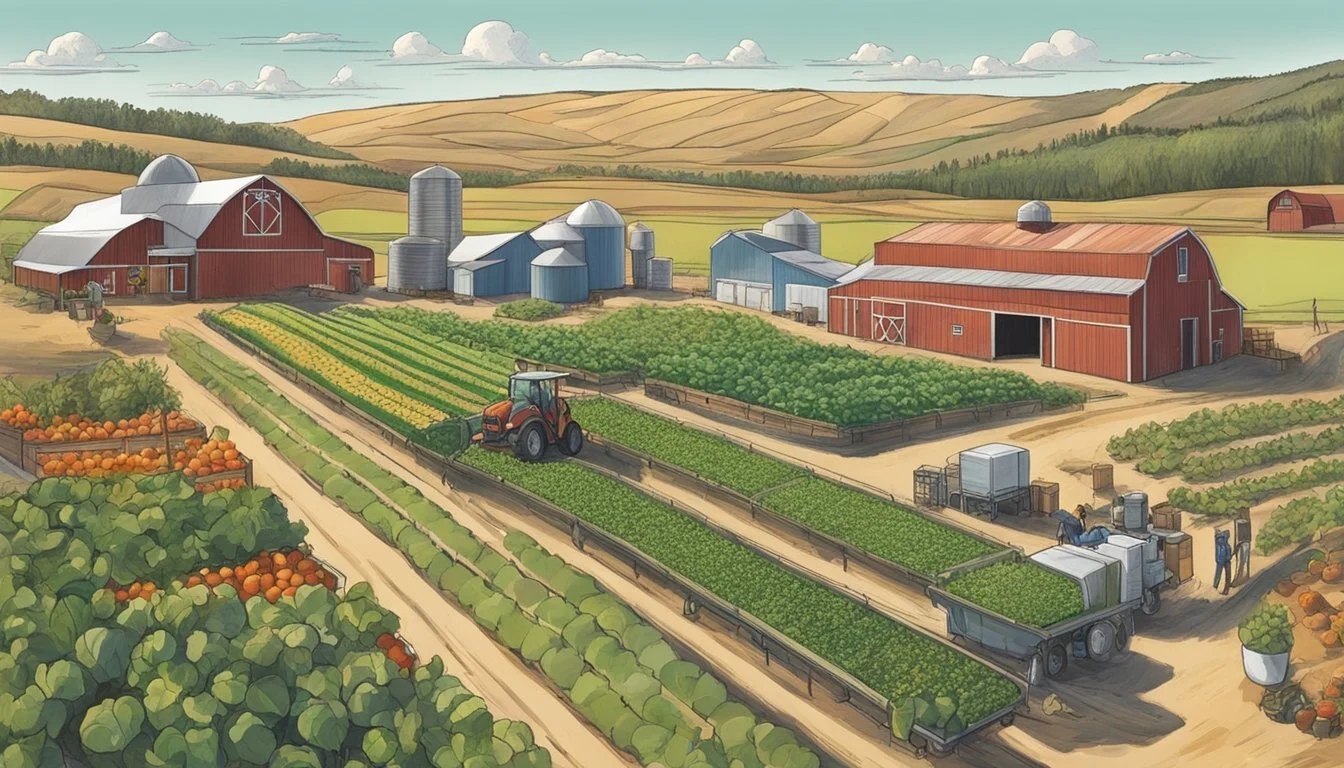Community Supported Agriculture (CSA) in Colorado
Benefits and Local Impact
Community Supported Agriculture, widely known as CSA, is an agricultural model that has found a welcoming environment in Colorado. Through CSA, individuals and families can subscribe to harvest shares from local farms, paying an upfront seasonal fee which ensures a steady flow of fresh, locally-grown produce. This mutually beneficial relationship bolsters Colorado's agricultural economy by providing farmers with direct financial support and reducing the uncertainty that comes with crop cultivation.
In the state of Colorado, a diverse range of farms offer CSA programs that allow community members to become a central part of the local food system. These farms cater to a variety of preferences and needs, often including options for organically grown fruits, vegetables, and other farm products. By participating in CSA, locals are given the opportunity to immerse themselves in a deeper understanding of how their food is produced and to form resilient bonds with the farmers who grow it.
Colorado's CSA farms promote sustainability and environmental stewardship, emphasizing the importance of reducing food miles, supporting the local economy, and preserving the ecological integrity of the land. From the urban centers near Denver to the more rural outskirts, CSA programs are a concrete expression of Colorado's commitment to fostering a close-knit, sustainable, and thriving agricultural community.
History of CSA in Colorado
Community Supported Agriculture in Colorado has a diverse history deeply entwined with local culture and commitment to sustainable farming. The statewide adoption of CSAs has allowed consumers to actively engage in the local agricultural economy, benefiting both the land and the community.
Origins and Cultural Heritage
The concept of CSA in Colorado mirrors the broader movement that started in Japan in the 1970s and reached the United States in the 1980s. It was embraced in Colorado as a way to preserve cultural heritage through sustainable agriculture. Coloradans have long valued environmental stewardship and community resilience, which are principles at the core of CSA programs. Boulder County, being a hub for environmental activism and conscious farming practices, played a significant role in propagating the CSA model within the state.
Significant CSA Farms in Colorado
Aspen Moon Farm and Monroe Organic Farms are notable examples in Colorado's CSA landscape. Aspen Moon Farm, located in Boulder County, thrives on biodynamic and organic farming principles, offering shares that connect consumers directly to the land. Monroe Organic Farms, situated in Weld County, has the distinction of being one of the oldest CSAs in Colorado, fostering community relationships through farm memberships and shares for several generations.
Both farms exemplify the CSA model that supports local producers while encouraging agricultural education and community engagement. They serve as anchors to the state's agricultural economy, providing fresh, locally sourced food, and preserving farming heritage for future Coloradans.
Benefits of Joining a CSA
Community Supported Agriculture in Colorado not only fosters a partnership between local farmers and consumers but also provides significant nutritional benefits and bolsters the local economy.
Shared Risk and Partnership
In a CSA, members buy shares of a farm's harvest in advance, creating a shared risk and partnership between the farmers and the community. This model allows farmers to receive upfront capital to cover anticipated costs of the farm operation. By participating, consumers become partners with the farmers, sharing in the risk that comes with agriculture—such as adverse weather or pests.
Nutritional and Health Advantages
Members of a CSA benefit greatly from fresh, nutritious produce that is often organic and free from harmful pesticides. Having a weekly share of the farm's production ensures that individuals and families incorporate a variety of fresh vegetables and fruits into their diets, which can lead to better health and well-being.
Supporting Local Economy
Joining a CSA directly contributes to the local economy. Consumers' money goes straight to local farmers, helping to make farming economically viable. As members invest in their local farms, they help to sustain and grow agricultural operations within their community, ensuring that these farms can continue to provide affordable, fresh produce.
By partaking in a CSA, consumers gain more than just a food source—they engage in a sustainable and ethical food system that enriches their community on multiple levels.
Environmental Impact
Community Supported Agriculture (CSA) in Colorado has a tangible effect on reducing the state's ecological footprint and shaping sustainable farming practices.
Reducing Ecological Footprint
CSAs often result in less pollution and a smaller ecological footprint compared to traditional grocery supply chains. By localizing the food supply, these programs limit the need for long-distance shipping, which not only lowers greenhouse gas emissions but also reduces the packaging and preservation requirements that often contribute to waste. For consumers, participating in CSAs means eating seasonally and regionally, further minimizing the impact on the environment.
Researchers calculate ecological footprints by analyzing productive land area required to support a population's lifestyle. In Colorado, CSAs play a pivotal role in shrinking this footprint by promoting food sourcing within close proximity to where it is consumed.
Organic Practices and Pesticide Use
Organic farming practices are central to many CSAs in Colorado. By avoiding synthetic pesticides and herbicides, these farms contribute to healthier soil and ecosystems. Farms that are not certified organic may still follow organic practices, focusing on natural pest control and the utilization of organic fertilizers.
Regenerative farming techniques, which go beyond organic methods, are also employed to rejuvenate the soil and sequester carbon. These practices transform agriculture into a restorative act. In Colorado, CSA farms integrating regenerative methods are leading by example in the sustainable agriculture movement.
Exploring CSA Farm Operations
Community Supported Agriculture (CSA) farms in Colorado operate with a commitment to sustainable agriculture and community engagement. They employ diverse farming techniques and face unique challenges inherent to their direct-to-consumer model.
Farming Techniques and Practices
Colorado CSA farms integrate a variety of methods to produce high-quality, often organic, produce and livestock. Many farms adhere to organic practices, avoiding synthetic pesticides and herbicides in favor of natural alternatives. Grass-fed livestock systems are a hallmark of some CSAs, promoting animal health and environmental benefits. A typical CSA farm might offer a selection of:
Seasonal vegetables: Grown with an emphasis on ecological balance.
Blooms: Cultivated for local flower shares with an eye for sustainability.
Grass-fed meats: Raised to provide a healthier option for consumers.
Challenges of Running a CSA
The operation of a CSA entails several challenges that farmers must navigate.
Market Fluctuations: They must maintain a steady base of members to offset the unpredictability of market demands.
Resource Allocation: Balancing limited resources such as water, labor, and land can be demanding.
Public Outreach: Educating the community about the benefits of CSA programs is critical for sustained success.
Weather Dependence: Like all agricultural endeavors, CSAs are at the mercy of weather conditions which can impact crop yields.
By employing strategic planning and community education, CSA farms in Colorado continue to thrive despite these challenges.
Types of Products Offered
Colorado's Community Supported Agriculture programs are lauded for providing a diverse array of products straight from local farms to consumers. Emphasizing fresh, often organic, and sustainable produce and animal products, these CSAs reflect the state's dedication to healthy living and environmental stewardship.
Fresh Vegetable Varieties and Availability
CSAs across Colorado offer an extensive selection of fresh vegetables. Members can anticipate weekly shares bursting with:
Heirloom tomatoes
Zesty peppers
With a focus on seasonality, CSAs ensure the availability of vegetables corresponds with Colorado's growing seasons, which typically range from May through October for most varieties. Many CSAs highlight heirloom varieties, known for their unique flavors and historical importance.
Livestock and Animal Products
Family-owned farms participating in CSA programs often extend beyond produce, incorporating livestock and animal products. Consumers benefit from:
Grass-fed beef from cows raised on open pastures
Free-range eggs from chickens
Pork from pigs reared on a natural diet
Animal welfare is paramount, with many CSAs subscribing to ethical farming practices. These include providing ample space for animals and using feeds free from antibiotics and hormones, thereby ensuring high-quality, healthful products reach the member's table.
Community Engagement and Education
Community Supported Agriculture (CSA) in Colorado actively engages community members through educational opportunities and hands-on experiences. These initiatives focus on enhancing local food systems, preserving cultural heritage, and disseminating sustainable farming techniques.
Events and Volunteering
CSA Programs across Colorado frequently host events designed to encourage community participation and volunteer support. Such events provide an avenue for individuals to connect with their local food hubs and urban farms, fostering a deeper understanding of agricultural practices.
Event Types:
Farm Tours: Visitors learn about eco-friendly farming methods.
Harvest Days: Community members assist with gathering crops.
Workshops: Experts share knowledge on topics like composting.
Volunteer Opportunities not only aid in the day-to-day operations of a CSA but also imbue volunteers with a sense of stewardship towards their local food sources. They may engage in:
Planting and maintenance of community gardens
Assisting with distribution at local food hubs
Preserving the cultural heritage of regional agriculture through various projects
CSA as a Learning Resource
Educational Programs run by CSAs serve as critical resources for community members to learn about sustainable living and food sovereignty. Through participation, individuals gain practical experience with farming practices tailored to Colorado's unique climate and topography.
Education Topics:
Environmentally sustainable practices: Covering soil health, water conservation, and biodiversity.
Cultural significance: Exploring the role of agriculture in local heritage.
Nutrition: Educating on the benefits of fresh, local produce.
Urban Farms play a crucial role in this education by offering a closer look at how food is grown within city environments. These spaces become living classrooms, demonstrating the viability of bringing agriculture into denser, urbanized areas.
Economic Aspects of CSA
In Colorado, Community Supported Agriculture (CSA) presents a model that reconfigures the economic relationship between producers and consumers, aiming for mutual financial sustainability and accessible pricing structures.
Membership Models and Affordability
CSAs in Colorado operate primarily on a membership basis, where customers pay in advance for a season's worth of agricultural produce. This model offers several affordable options for consumers:
Standard Share: Typically provides weekly produce for a family of four.
Small Share: Designed for individuals or smaller households.
Payment Plans: Some CSAs allow installment payments for shares.
Sliding Scale Fees: Adjusted pricing based on income to promote equitable access.
This prepayment structure aids in making fresh, locally grown produce more affordable and accessible, while also respecting the equitable principles of the agricultural system.
Financial Sustainability for Farmers
CSAs contribute to the financial sustainability of farmers by providing them with:
Direct-to-consumer sales: Farmers receive payment upfront, which helps in planning and covering the initial costs of production.
Stabilized Income: Income is more predictable as farmers know the number of shares sold.
Reduced Marketing Costs: CSAs often incur lower marketing and distribution expenses compared to traditional retail channels.
By cementing the direct-to-consumer sales channel, CSAs mitigate many of the financial uncertainties associated with farming, leading to a more resilient agricultural system.
CSA Distribution and Sales
Community Supported Agriculture (CSA) in Colorado has leveraged both traditional and innovative distribution methods to enhance its reach and impact. Through direct marketing efforts and embracing online platforms, CSAs have been able to efficiently connect with consumers, thereby elevating their presence in the local food market.
Direct Marketing and Farmers Markets
In Colorado, CSAs rely heavily on direct marketing strategies to sell their produce. Many CSA farms participate in local farmers markets as a primary avenue for direct-to-consumer sales. These markets not only allow for immediate sales but also serve as a hub for building community and engaging directly with consumers. Direct-to-consumer sales form a significant part of their revenue, fostering a direct relationship between farmers and their customers.
Online Sales and Delivery Options
With the rise of digital platforms, many CSA operations have developed online sales systems. This transition allows customers to place orders conveniently, often with options for home delivery or designated pickup locations. CSA farms may operate their own websites or partner with regional online marketplaces to reach a broader audience. The flexibility of online sales and delivery has expanded the market for CSAs, making local, fresh produce more accessible to residents across Colorado.
Legal and Regulatory Factors
Community Supported Agriculture programs in Colorado are subject to specific legal and regulatory considerations. These ensure that CSAs operate within the guidelines set by the U.S. Department of Agriculture and adhere to local zoning and land-use policies.
U.S. Department of Agriculture Compliance
The U.S. Department of Agriculture (USDA) sets forth various regulations that CSA programs must follow. The Census of Agriculture, conducted by the USDA, collects data that includes CSA operations. In compliance with federal standards, CSA farms must report their sales and practices accurately. This data contributes to the broader understanding of direct-to-consumer sales and agricultural trends. Colorado CSAs are, therefore, expected to maintain transparency and accuracy in their reports to the USDA.
Local Zoning and Land-Use Policies
Local zoning and land-use policies greatly affect where and how CSA operations can function. Each Colorado municipality may have distinct regulations impacting agricultural use within its jurisdiction. Farmers are tasked with ensuring their farming practices and CSA distribution points comply with:
Zoning restrictions which may dictate land use within certain areas.
Permit requirements which could range from building structures to hosting CSA pick-up points.
Familiarity with these policies is crucial for the legal establishment and continued operation of CSA programs in Colorado.











